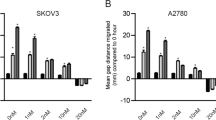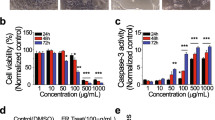Abstract
RRR-α-tocopherol ether linked acetic acid analog (α-TEA), is a potential chemotherapeutic agent for ovarian cancer. Pro-death and pro-life signaling pathways were studied to understand the anti-cancer actions of α-TEA on cisplatin-sensitive (A2780S) and -resistant (A2780/cp70R) human ovarian cancer cells. Both cell lines were refractory to Fas; whereas, α-TEA sensitized them to Fas signaling. α-TEA increased levels of Fas message, protein and membrane-associated Fas. Neutralizing antibodies to Fas or Fas L partially blocked α-TEA-induced apoptosis. α-TEA induced prolonged activation of c-Jun N-terminal kinase (JNK) and its substrate c-Jun; Bax conformational change; and cleavage of Bid and caspases-8, -9 and -3. Chemical inhibitors of JNK, and caspases blocked α-TEA-induced apoptosis. α-TEA decreased phosphorylation of protein kinase B (Akt/PKB) and extracellular signal-regulated kinase (ERK1/2), as well as cellular FLICE-like inhibitory protein (c-FLIP) and Survivin protein levels. Knockdown of Akt and ERK activity using phosphoinositide- 3-kinase (PI3K) and mitogen-activated protein kinase kinase (MKK1) inhibitors enhanced α-TEA-induced apoptosis. Over-expression of constitutively active Akt2 and MKK1 blocked α-TEA-induced apoptosis. Collectively, data show α-TEA to be a potent apoptotic inducer of both cisplatin-sensitive and -resistant human ovarian cancer cells via activating death receptor Fas signaling and suppressing anti-apoptotic AKT and ERK targets.
Similar content being viewed by others
References
Jemal A, Siegel R, Ward E, Murray T, Xu J, Smigal C, Thun MJ (2006) Cancer statistics 2006. CA Cancer J Clin 56:106–130
du Bois A, Luck HJ, Meier W et al (2003) A randomized clinical trial of cisplatin/paclitaxel versus carboplatin/paclitaxel as first-line treatment of ovarian cancer. J Natl Cancer Inst 95:1320–1329
Fraser M, Leung B, Jahani-Asl A, Yan X, Thompson WE, Tsang BK (2003) Chemoresistance in human ovarian cancer: the role of apoptotic regulators. Reprod Biol Endocrinol 1:66
Lawson KA, Anderson K, Simmons-Menchaca M et al (2003) Novel vitamin E analogue decreases syngeneic mouse mammary tumor burden and reduces lung metastasis. Mol Cancer Ther 2:437–444
Lawson KA, Anderson K, Simmons-Menchaca M et al (2004) Comparison of vitamin E derivatives α-TEA and VES in reduction of mouse mammary tumor burden and metastasis. Exp Biol Med (Maywood) 229:954–963
Lawson KA, Anderson K, Snyder RM et al (2004) Vitamin E analogue and 9-nitro-camptothecin administered as liposome aerosols decrease syngeneic mouse mammary tumor burden and inhibit metastasis. Cancer Chem Pharm 421–431
Zhang S, Lawson KA, Simmons-Menchaca M, Sun L, Sanders BG, Kline K (2004) Vitamin E analog α-TEA and celecoxib alone and together reduce human MDA-MB-435-FL-GFP breast cancer burden and metastasis in nude mice. Breast Cancer Res Treat 87:111–121
Anderson K, Lawson KA, Simmons-Menchaca M, Sun L, Sanders BG, Kline K (2004) α-TEA plus cisplatin reduces human cisplatin-resistant ovarian cancer cell tumor buren and metastasis. Exp Biol Med (Maywood) 229:1169–1176
Anderson K, Simmons-Menchaca M, Lawson KA, Atkinson J, Sanders BG, Kline K (2004) Differential response of human ovarian cancer cells to induction of apoptosis by vitamin E Succinate and vitamin E analogue, α-TEA. Cancer Res 15:4263–4269
Shun MC, Yu W, Gapor A et al (2004) Pro-apoptotic mechanisms of action of a novel vitamin E analog (α-TEA) and a naturally occurring form of vitamin E (δ-tocotrienol) in MDA-MB-435 human breast cancer cells. Nutr Cancer 48:95–105
Kline K, Lawson KA, Yu W, Sanders BG (2003) Vitamin E and breast cancer prevention: current status and future potential. J Mammary Gland Biol Neoplasia 8:91–102
Yu W, Israel K, Liao QY, Aldaz CM, Sanders BG, Kline K (1999) Vitamin E succinate (VES) induces Fas sensitivity in human breast cancer cells: role for Mr 43,000 Fas in VES-triggered apoptosis. Cancer Res 59:953–961
Yu W, Simmons-Menchaca M, You H et al (1998) RRR-alpha-tocopheryl succinate induction of prolonged activation of c-jun amino-terminal kinase and c-jun during induction of apoptosis in human MDA-MB-435 breast cancer cells. Mol Carcinog 22:247–257
Thomas M, Finnegan CE, Rogers KM et al (2004) STAT1: a modulator of chemotherapy-induced apoptosis. Cancer Res 64:8357–8364
Yu W, Sanders BG, Kline K (2003) RRR-alpha-tocopheryl succinate-induced apoptosis of human breast cancer cells involves Bax translocation to mitochondria. Cancer Res 63:2483–2491
Martin JH, Potthoff A, Ledig S et al (2004) Effect of H. pylori on the expression of TRAIL, FasL and their receptor subtypes in human gastric epithelial cells and their role in apoptosis. Helicobacter 9:371–386
Yuan ZQ, Feldman RI, Sussman GE, Coppola D, Nicosia SV, Cheng JQ (2003) AKT2 inhibition of cisplatin-induced JNK/p38 and Bax activation by phosphorylation of ASK1: implication of AKT2 in chemoresistance. J Biol Chem 278:23432–23440
Whalen AM, Galasinski SC, Shapiro PS, Nahreini TS, Ahn NG (1997) Megakaryocytic differentiation induced by constitutive activation of mitogen-activated protein kinase kinase. Mol Cell Biol 17:1947–1958
Yu W, Liao QY, Hantash FM, Sanders BG, Kline K (2001) Activation of extracellular signal-regulated kinase and c-Jun-NH(2)-terminal kinase but not p38 mitogen-activated protein kinases is required for RRR-alpha-tocopheryl succinate-induced apoptosis of human breast cancer cells. Cancer Res 61:6569–6576
Bonny C, Oberson A, Negri S, Sauser C, Schorderet DF (2001) Cell-permeable peptide inhibitors of JNK: novel blockers of beta-cell death. Diabetes 50:77–82
Roucou X, Martinou JC (2001) Conformational change of Bax: a question of life or death. Cell Death Differ 8:875–877
Fulda S, Meyer E, Debatin KM (2000) Metabolic inhibitors sensitize for CD95 (APO-1/Fas)-induced apoptosis by down-regulating Fas-associated death domain-like interleukin 1-converting enzyme inhibitory protein expression. Cancer Res 60:3947–3956
Zaffaroni N, Pennati M, Daidone MG (2005) Survivin as a target for new anticancer interventions. J Cell Mol Med 9:360–372
Datta SR, Brunet A, Greenberg ME (1999) Cellular survival: a play in three Akts. Genes Dev 13:2905-2927
Panka DJ, Mano T, Suhara T, Walsh K, Mier JW (2001) Phosphatidylinositol 3-kinase/Akt activity regulates c-FLIP expression in tumor cells. J Biol Chem 276:6893–6896
Fornaro M, Plescia J, Chheang S et al (2003) Fibronectin protects prostate cancer cells from tumor necrosis factor-alpha-induced apoptosis via the AKT/survivin pathway. J Biol Chem 278:50402–50411
Wang W, Prince CZ, Mou Y, Pollman MJ (2002) Notch3 signaling in vascular smooth muscle cells induces c-FLIP expression via ERK/MAPK activation. Resistance to Fas ligand-induced apoptosis. J Biol Chem 277:21723–21729
Jalal Hosseinimehr S, Inanami O, Hamasu T et al (2004) Activation of c-kit by stem cell factor induces radioresistance to apoptosis through ERK-dependent expression of survivin in HL60 cells. J Radiat Res (Tokyo) 45:557–561
Debatin KM, Krammer PH (2004) Death receptors in chemotherapy and cancer. Oncogene 23:2950–2966
el-Deiry WS (1998) Regulation of p53 downstream genes. Semin Cancer Biol 8:345–357
Gopalan B, Litvak A, Sharma S, Mhashilkar AM, Chada S, Ramesh R (2005) Activation of the Fas-FasL signaling pathway by MDA-7/IL-24 kills human ovarian cancer cells. Cancer Res 65:3017–3024.
Shimada K, Nakamura M, Ishida E, Kishi M, Yonehara S, Konishi N (2003) c-Jun NH2-terminal kinase-dependent Fas activation contributes to etoposide-induced apoptosis in p53-mutated prostate cancer cells. Prostate 55:265–280
Jones NA, Turner J, McIlwrath AJ, Brown R, Dive C (1998) Cisplatin- and paclitaxel-induced apoptosis of ovarian carcinoma cells and the relationship between bax and bak up-regulation and the functional status of p53. Mol Pharmacol 53:819–826
Peter ME, Krammer PH (2003) The CD95(APO-1/Fas) DISC and beyond. Cell Death Differ 10:26–35
Liu J, Lin A (2005) Role of JNK activation in apoptosis: a double-edged sword. Cell Res 15:36–42
Mansouri A, Ridgway LD, Korapati AL et al (2003) Sustained activation of JNK/p38 MAPK pathways in response to cisplatin leads to Fas ligand induction and cell death in ovarian carcinoma cells. J Biol Chem 278:19245–19256.
Hang HY, Nishitoh H, Yang X, Ichijo H, Baltimore D (1998) Activation of apoptosis signal-regulating kinase 1 (ASK1) by the adapter protein Daxx. Science 281:1860–1863
Zu K, Hawthorn L, Ip C (2005) Up-regulation of c-Jun-NH2-kinase pathway contributes to the induction of mitochondria-mediated apoptosis by alpha-tocopheryl succinate in human prostate cancer cells. Mol Cancer Ther 4:43–50
Tsuruta F, Sunayama J, Mori Y et al (2004) JNK promotes Bax translocation to mitochondria through phosphorylation of 14-3-3 proteins. Embo J 23:1889–1899
Tsuruta Y, Mandai M, Konishi I et al (2001) Combination effect of adenovirus-mediated pro-apoptotic bax gene transfer with cisplatin or paclitaxel treatment in ovarian cancer cell lines. Eur J Cancer 37:531–541
Herod JJ, Eliopoulos AG, Warwick J, Niedobitek G, Young LS, Kerr DJ (1996) The prognostic significance of Bcl-2 and p53 expression in ovarian carcinoma. Cancer Res 56(9):2178–2184
Author information
Authors and Affiliations
Corresponding author
Rights and permissions
About this article
Cite this article
Yu, W., Shun, Mc., Anderson, K. et al. α-TEA inhibits survival and enhances death pathways in cisplatin sensitive and resistant human ovarian cancer cells. Apoptosis 11, 1813–1823 (2006). https://doi.org/10.1007/s10495-006-9234-5
Published:
Issue Date:
DOI: https://doi.org/10.1007/s10495-006-9234-5




